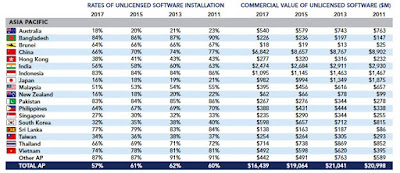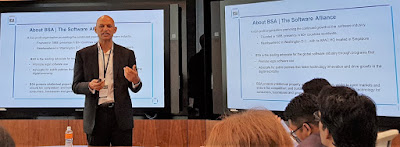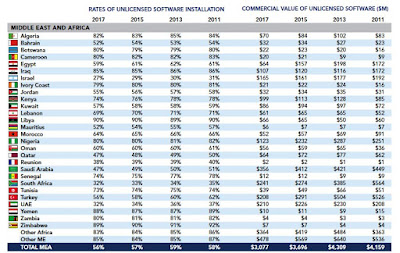Tarun Sawney, Senior Director – Asia Pacific, BSA, noted that unlicensed software continues to be widespread. Unlicensed software accounts for 37% of software installed on personal computers globally – a 2% drop from 2016. The commercial value of unlicensed software remains significant though it dropped 8% in constant currency, at US$46.3 billion globally.
While unlicensed software is a selling point for various merchants around the world, the BSA says that malware from unlicensed software costs companies worldwide nearly US$359 billion a year, and that CIOs say avoiding data hacks and other security threats from malware is the No. 1 reason for ensuring their networks are fully licensed. On the flip side, companies which implement a software asset management (SAM) and software license optimisation programme can increase profits by as much as 11% and save up to 30% in annual software costs.
 |
| Source: 2018 Global Software Survey from BSA. Rates of unlicensed software installation in the Asia Pacific region for 2017. |
Sawney also shared that the Asia Pacific region has the world’s highest percentage rate of unlicensed software use and greatest amount of dollar losses. More than half (57%) of all software is unlicensed in the region. The commercial value of unlicensed software in this region fell to US$16.4 billion, compared to US$19.1 billion in 2015, but remains the highest in the world.
Within the region:
▪ Bangladesh has the highest rate of unlicensed software use at 84%, followed by Indonesia and Pakistan, both at 83%
▪ Japan and New Zealand, both at 16%, and Australia with 18%, have the lowest rates of unlicensed software use. All three economies registered a 2% decrease, which can be partly attributed to the growing use of the cloud and software subscription services among enterprises
▪ All Asia Pacific economies surveyed had showed a decline in the rate of unlicensed software use with China and Vietnam registering the biggest drops. China decreased its rate from 70% in 2015 to 66% in 2017, and Vietnam went from 78% in 2015 to 74% in 2017.
▪ Significant decreases in shipments (-22%) and installed base (down 17%) in Hong Kong and Singapore (-13% and -12% respectively) helped intellectual property protection efforts in both these economies
According to the survey, a decline in both enterprise PC shipments and the PC installed base, and a drop in the consumer share of PC shipments across many economies in the region, have influenced the statistics. Other factors include increased enforcement and legalisation efforts by governments in Asia Pacific, and an increase in the use of software-as-a-service (SaaS, or cloud) subscription models.
 |
| Sawney introduces the BSA at Microsoft's Digital Trust Asia event in Singapore. |
In the Middle East and Africa, unlicensed software rates are just behind that in Asia Pacific at 56%, but with the software valued at just over US$3 billion. In Yemen 88% of software is unlicensed, while in Iraq that figure is 85%.
 |
| Source: 2018 Global Software Survey from BSA. Rates of unlicensed software installation in the Middle East and Africa region for 2017. |
"CIOs recognise the link between malware and unlicensed software. Previously they couldn't be bothered," he said.
Another reason could be legal consequences. He lauded China for opening courts dedicated to intellectual property cases, making those infringing software licences much more accountable. "In China these courts are making laws that is good IP law. Based on the decisions that they are making they are very effective. For the 1st time we are seeing decisions that are consistent," he explained.
"Previously nothing happened, now you will be found out. There was a legitimate threat to them for using unlicensed software, not a cybersecurity threat, more of a legal threat."
Many factors have to come together to create the right environment for enforcement, he added. The legal system must move forward at the same rate as technology, and there have to be people specialised in intellectual property law, he said. In addition, courts have to have enough capacity to actually hear each case.
Explore:
The 2018 BSA Global Software Survey was released in June 2018. Download the report (PDF)
Read the WorkSmart Asia blog post about the PC Test Purchase Sweep
*BSA’s Global Software Survey, conducted in partnership with IDC, estimates the volume and value of unlicensed software installed on personal computers in 2017, across more than 110 national and regional economies. It also reveals key attitudes and behaviours related to software licensing, intellectual property, and emerging technologies based on a global survey of more than 20,000 respondents and nearly 23,000 responses from consumers, employees, and CIOs.

